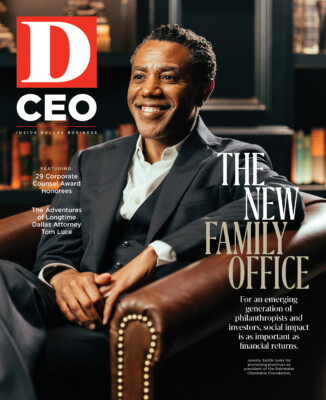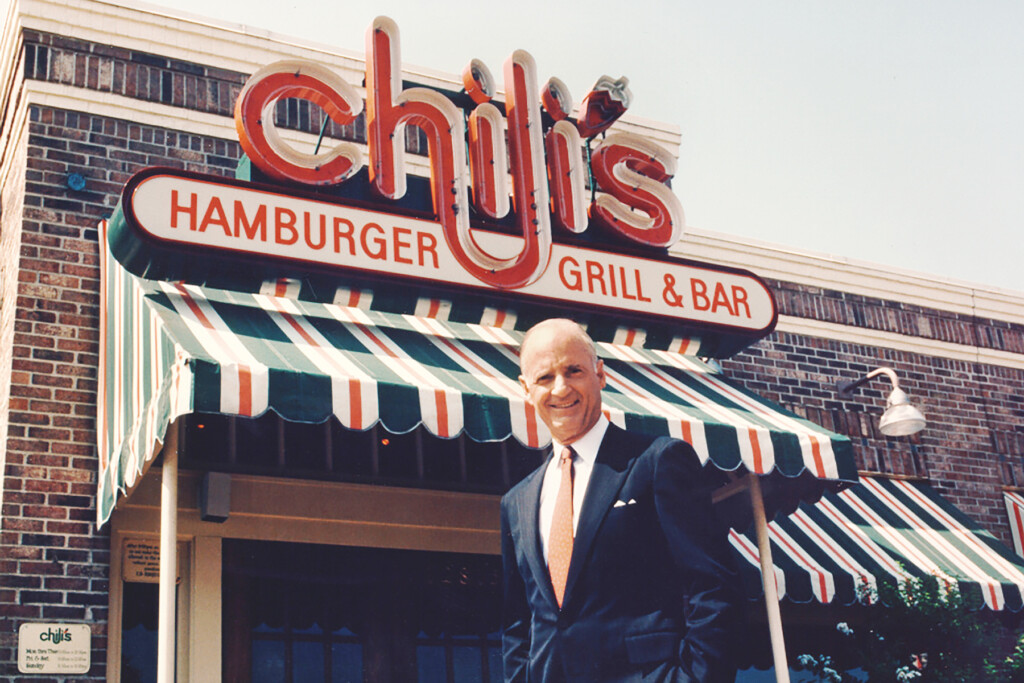From October 2023

Veteran, equestrian, father, pentathlon competitor, Dallasite, husband, and most famously, restaurateur, Norman Brinker’s illustrious career began with Jack-in-the-Box in the 1950s. He helped grow the company into a fast-food chain and became its president in two years. Brinker then decided to undertake his own venture and founded Steak and Ale. It is credited with launching casual dining, revered as the birthplace of the salad bar and stock service lines. Brinker sold Steak and Ale for about $100 million in 1976 to Pillsbury Group and went on to manage operations of Bennigan’s, Burger King, and Häagen-Dazs.
Brinker turned entrepreneur in 1966 when he broke ground in Dallas on Brink’s Coffee Shop in East Dallas. Designed by Paul & Paul Architects in 1964, Brink’s is perhaps the city’s finest remaining example of Modern “Googie” style architecture, which you can still see as it is the current home of Lucky’s Chicken on Gaston Ave.
In 1983, he acquired Chili’s, expanded the menu, and used what he learned at Steak and Ale to help the brand become the bedrock of Brinker International, which owns Maggiano’s Little Italy, It’s Just Wings, and has a minority stake in Romano’s Macaroni Grill. Today, Brinker International is one of the world’s largest restaurant holding companies, with 1,600 locations across 28 countries and 62,000 employees.
A Navy veteran, Brinker’s horsemanship skills qualified him for the U.S. equestrian team in the 1952 Olympics. He also competed in the 1954 modern pentathlon championships in Budapest, Hungary, while simultaneously serving in the Navy following the Korean War.
When his wife Nancy’s sister, Susan G. Komen, died of breast cancer in 1980, he helped her establish the renowned foundation that bears his sister-in-law’s name. His daughter Cindy remembers how the principles of listening and trusting others in business guided her father.
In 1993 Brinker sustained severe injuries following a polo match. He was in a coma for several weeks and then paralyzed for the three months, but true to form, Brinker was mobile and back at work by the fourth month.
Brinker’s daughters, Cindy and Brenda, refer to him as their best friend to this day and describe him as nothing but selfless, loving, joyful, and humble.
“He so believed in the magic of people,” Brinker’s daughter Cindy says. “He wanted to surround himself with big thinkers, with honest people, and the best and the brightest. Our home was a smorgasbord of joy, laughter, and conversation.”
Brinker presided as chairman and president of Brinker International until his retirement in 2000, concluding a five-decade-long career in hospitality. Brinker was remembered for being genuine, selfless, and kind. He died in 2009.
The restaurateur lived by three mottos that he instilled in his daughters, who have shared them below.
- “It doesn’t matter if you have the capabilities to lead. What matters is, are you worthy of being followed?”
Brinker was known to be an honest man, so much so that he often sealed deals with handshakes rather than formally written contracts because “honesty was the bedrock, the nucleus around which his world revolved.”
- “Never care about who gets the credit because life is a team sport.”
Brinker was known to lend a hand to his competitors, many of whom began their careers under him through Steak and Ale’s leadership training programs—the founders of Chuck E. Cheese, T.G.I. Friday’s, and Outback Steakhouse all learned from Brinker and often came to him with their problems despite being competitors in the industry.
- “Seek first to understand before you seek to be understood. You’ve got two ears and one mouth – listen to what others have to say.”
Although he had several thousand employees, Brinker made a point of trying to learn everyone’s names. According to his daughters, he gave everyone the time of day, even when it came at the cost of interrupting a family meal (at one of the restaurants) to get to know an employee.
“He was a remarkable man who just happened to be a very good restaurateur,” Cindy Brinker says.
Author







